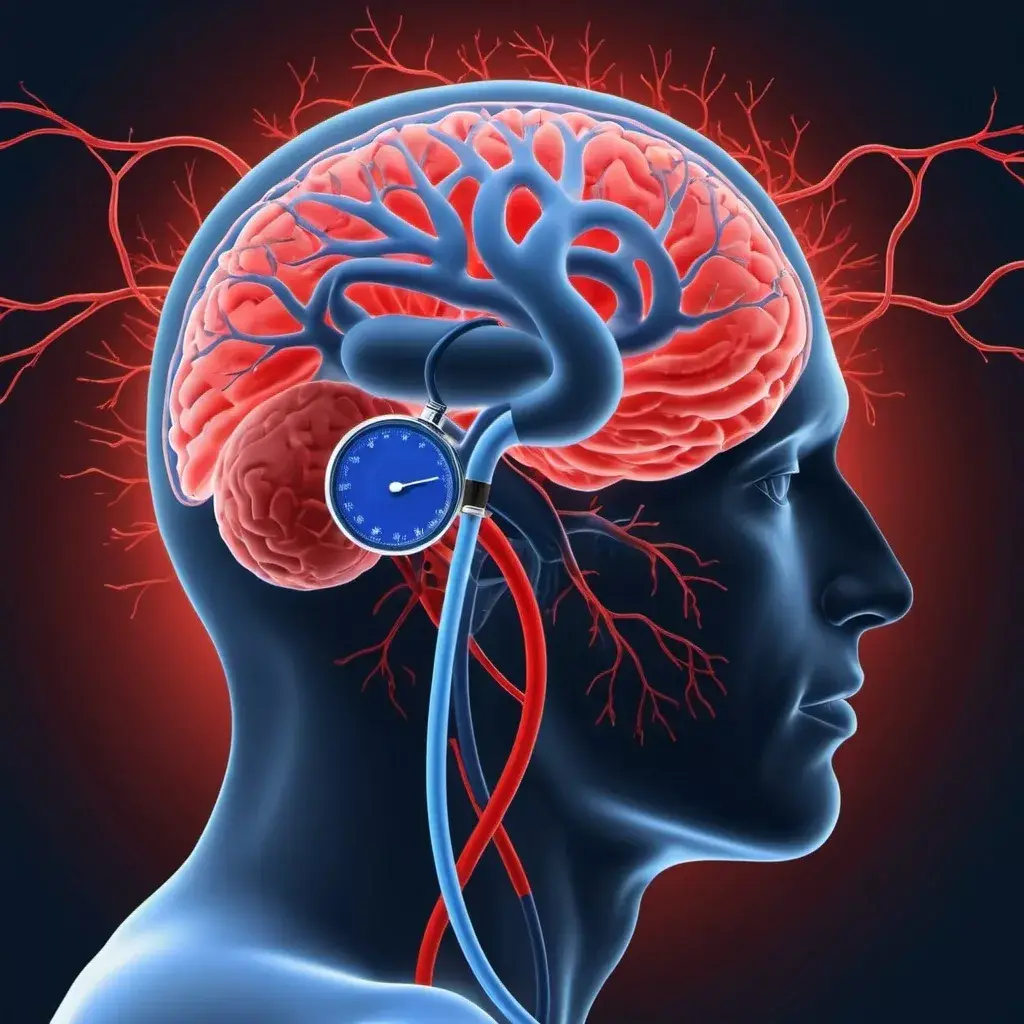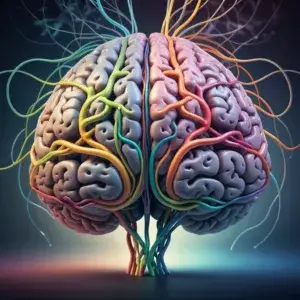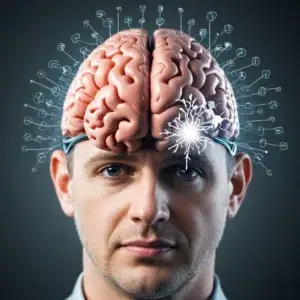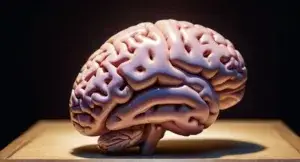Table of Contents
High Blood Pressure and Cognitive Function: What You Need to Know
High blood pressure, also known as hypertension, is a well-known risk factor for several serious health conditions, including heart disease and stroke. However, its impact on cognitive function is less commonly discussed, yet equally significant. Emerging research suggests that managing blood pressure is not only vital for heart health but also for maintaining cognitive function and preventing neurodegenerative diseases.
Understanding the Link Between High Blood Pressure and Cognitive Function
High blood pressure affects the brain in multiple ways. When blood pressure is consistently elevated, it can lead to the hardening and narrowing of arteries, reducing the flow of oxygen-rich blood to the brain. This diminished blood supply can cause damage to the brain’s structure and function over time. The result? An increased risk of cognitive decline, memory problems, and even dementia.
Studies have shown that individuals with high blood pressure in mid-life are more likely to experience cognitive decline later in life. For example, research from the Uppsala Longitudinal Study of Adult Men indicated that elevated systolic blood pressure significantly increases the risk of vascular dementia. This connection between high blood pressure and cognitive function underscores the importance of managing blood pressure from an early age.
The Role of Blood Pressure Monitoring
Monitoring blood pressure is crucial in understanding and mitigating its impact on cognitive function. Traditional blood pressure checks at the doctor’s office may not provide a complete picture, as blood pressure can fluctuate throughout the day. Research highlights the importance of continuous blood pressure monitoring, particularly at night, when fluctuations can go unnoticed but still cause harm.
Technological advancements in blood pressure monitoring could revolutionize how we approach hypertension management. A continuous, non-invasive blood pressure monitor would allow individuals to track their levels in real time, providing critical data that could help prevent cognitive decline.
The Connection Between High Blood Pressure and Cognitive Function
High blood pressure is not only linked to general cognitive decline but also to specific neurodegenerative diseases, such as Alzheimer’s disease and vascular dementia. The damage caused by hypertension can lead to the accumulation of beta-amyloid plaques and tau proteins in the brain, both of which are associated with Alzheimer’s. Additionally, hypertension-related brain damage, such as microinfarcts and microbleeds, further exacerbates cognitive impairment and the progression of these diseases.
Recent studies have also explored the complex relationship between late-life hypertension and cognitive function. While managing blood pressure remains critical, there is evidence suggesting that both low and high blood pressure in older adults can increase the risk of dementia, emphasizing the need for personalized treatment plans.
Blood Pressure Management: Steps to Protect Your Cognitive Function
Managing blood pressure is a key strategy in reducing the risk of cognitive decline. By implementing certain lifestyle changes and, if necessary, medical interventions, you can keep your blood pressure within a healthy range and protect your brain health.
Action List for Managing Blood Pressure:
Maintain a Healthy Diet:
- Follow a diet rich in fruits, vegetables, whole grains, and lean proteins.
- Limit your intake of salt, processed foods, and saturated fats.
- The DASH (Dietary Approaches to Stop Hypertension) diet is particularly effective in lowering blood pressure.
Exercise Regularly:
- Aim for at least 150 minutes of moderate aerobic activity or 75 minutes of vigorous activity per week.
- Activities like walking, cycling, swimming, and strength training help lower blood pressure.
Maintain a Healthy Weight:
- Losing excess weight can significantly reduce blood pressure.
- Even a small weight loss can have a noticeable impact on blood pressure levels.
Manage Stress:
- Practice stress-reducing techniques such as meditation, deep breathing, yoga, or progressive muscle relaxation.
- Ensure adequate sleep and avoid chronic stressors whenever possible.
Limit Alcohol and Tobacco Use:
- Drink alcohol in moderation—no more than one drink per day for women and two for men.
- Quit smoking and avoid exposure to secondhand smoke.
Monitor Your Blood Pressure:
- Regularly check your blood pressure at home or have it checked by a healthcare professional.
- Keep a log of your readings and share them with your doctor to track your progress.
Take Medications as Prescribed:
- If your doctor has prescribed medication for high blood pressure, take it as directed.
- Discuss any side effects or concerns with your healthcare provider to ensure effective management.
The Role of Nootropic Drugs in Blood Pressure Management
While nootropic drugs are typically used to enhance cognitive function, some have shown potential benefits in managing high blood pressure, which can indirectly help protect cognitive health:
- L-Theanine: Known for its calming effects, L-Theanine can help reduce stress-induced high blood pressure by promoting relaxation.
- Magnesium L-Threonate: This form of magnesium may help lower blood pressure by relaxing blood vessels and improving endothelial function.
- Rhodiola Rosea: An adaptogen that helps reduce stress, Rhodiola Rosea may help prevent stress-related spikes in blood pressure.
- Ashwagandha: Another adaptogen that can reduce anxiety and stress, potentially lowering blood pressure.
- Bacopa Monnieri: While primarily known for its cognitive benefits, Bacopa Monnieri may have mild blood pressure-lowering effects.
Important Note: While these nootropic supplements may offer some benefit in managing high blood pressure, they should not replace conventional hypertension treatments prescribed by a healthcare professional. Always consult with a healthcare provider before starting any new supplement regimen, especially if you have pre-existing health conditions or are taking other medications.
The link between high blood pressure and cognitive function is clear: managing hypertension is not just about protecting your heart but also about safeguarding your brain. By maintaining optimal blood pressure levels through lifestyle changes, medical interventions, and potentially beneficial nootropic supplements, you can significantly reduce your risk of cognitive decline and neurodegenerative diseases. As research continues to evolve, the importance of continuous monitoring and personalized treatment becomes increasingly apparent, offering hope for better management and prevention of these conditions.
Maintaining cognitive health is a lifelong commitment, and managing high blood pressure is a critical part of that journey. Don’t wait—start monitoring and managing your blood pressure today to protect your cognitive function tomorrow.
References
- Uppsala Longitudinal Study of Adult Men. “The relationship between mid-life BP and cognitive decline.” Current Hypertension Reports Link.
- Hypertension, Brain Damage and Cognitive Decline. PubMed Link.
- Neurovascular and Cognitive Dysfunction in Hypertension. PubMed Link.
- Late-life hypertension as a risk factor for cognitive decline and dementia. Hypertension Research Link.
- L-Theanine and blood pressure. Hypertension and Cognition Link.








I had no idea that high blood pressure was linked to general cognitive and also specific neurodegenerative diseases. But I suppose in most cases high blood pressure does cause strokes, so this makes sense.
I also didn’t know that low or high blood pressure could also be bad as one ages, and increase the risk of dementia. So it seems it is vital to check and monitor one’s blood pressure often and make changes if it goes to much in either direction.
I think if one can it is better to stay off chronic medication for as long as possible, because of all the side effects, so following the living healthy advice that you have given is definitely the best choice.
Hi Michel thanks for stopping by. Yes definitely living healthy with nutrition, physical exercise and mindfulness is a great way to increase your chances of staying healthy for as long as possible. And measuring your blood pressure on a regular basis is really important. For a lot of people their blood pressure can be higher than normal, but because there can be no signs or symptoms they often don’t know this. So by the time they find out there can be some damage done already. Best to know in advance I think
I have a history of high blood pressure in my family; and I’ve seen my mother take medication to handle it. However, I don’t intend to have it because I want to take care of my health. So, I try to walk at least an hour 3 times a week. And I always take the stairs to get my aerobic activity. Also, I try to change my diet, but this is very challenging! I’ll start a new diet in September, with only fruits, vegetables, protein, and nuts.
Hi Angel thanks for stopping by. Whilst genetics play a part in your chances of having high blood pressure they don’t have to make it a given that you will develop high blood pressure. If you think of your genes like switches, your lifestyle really determines whether or not the switch is turned on. So without simplifying it too much, if you maintain a healthy lifestyle with good nutrition, physcial activity and mindfulness the high blood pressure switch doesn’t ever have to be turned on for you. I think it is often easy for people to blame genetics so that they don’t have to look at their poor lifestyle choices.
The connection between high blood pressure and cognitive health is something I didn’t quite know and learnt today. How blood pressure impacts brain function has really opened my eyes and has deepened my understanding of the importance of monitoring and managing cardiovascular health for overall well-being. It’s fascinating how intricately our body systems are linked, underscoring the significance of holistic health approaches. Thank you for sharing this valuable article.
Hi Elias thanks for stopping by. Yes the connection between high blood pressure and cognitive health is an area that is expanding. It is been largely unknown for most people up to this point in time but I believe we will see more research in this area in the next few years and the connection will become more significant for a lot of patients
This article on the link between high blood pressure and cognitive function is both enlightening and a bit concerning. The connection between hypertension and cognitive decline isn’t something that’s often talked about, but it’s clearly something we should all be paying more attention to.
I have a few questions and thoughts on the topic. First, regarding the continuous blood pressure monitoring mentioned—how accessible are these advanced monitoring tools for the average person? It seems like a game-changer in preventing long-term damage, but I wonder about the practicality and cost of implementing this on a larger scale.
The discussion on lifestyle changes is spot on. I’ve personally seen the benefits of adopting a healthier diet and regular exercise. A few years ago, I made significant lifestyle adjustments after being diagnosed with high blood pressure, and the positive impact on both my physical and mental health has been substantial. However, I’m curious about how these lifestyle changes compare to the effectiveness of nootropic supplements in managing blood pressure. While the idea of using supplements like L-Theanine or Magnesium L-Threonate is intriguing, I wonder how they stack up against traditional methods like diet, exercise, and prescribed medication. Has anyone here tried these supplements, and if so, what was your experience?
Another point that stood out to me was the dual risk associated with both high and low blood pressure in older adults. It’s a delicate balance, and it makes me think about how we might need more personalized treatment plans as we age. I’d love to hear from others who are managing blood pressure in their later years—how do you strike that balance?
Overall, this article serves as a powerful reminder that managing high blood pressure is not just about avoiding heart disease but also about protecting our cognitive health. It’s definitely a wake-up call for me to be more vigilant about my blood pressure and to encourage others to do the same. I’m eager to hear how others are approaching this challenge, especially when it comes to integrating newer technologies and methods into their routines.
HI Lawrence thanks for stopping by and great questions. In terms of wearable continuous blood pressure monitors unfortunately they are not greatly accessible at this stage but I believe they will become more accessible over the next 5-10 years. Omron do have a wearable BP monitor called Heart Guide that is FDA approved.
Lifestyle changes are vital for both your physical and brain health. You can’t take a nootropic supplement or any other kind of supplement if your nutrition and physical routines are poor and expect it to have great benefit. Supplements will supplement the benefits of lifestyle changes but will not compensate for poor lifestyle choices.
Personalised treatment plans will also become much more popular over the course of the next 5-10 years as we get more research and developments in technology. This will help to optimise health markers like blood pressure in the future